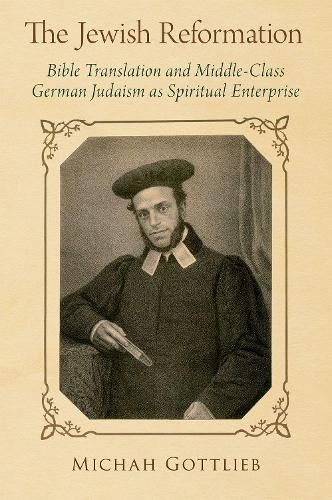Readings Newsletter
Become a Readings Member to make your shopping experience even easier.
Sign in or sign up for free!
You’re not far away from qualifying for FREE standard shipping within Australia
You’ve qualified for FREE standard shipping within Australia
The cart is loading…






In the late eighteenth century, German Jews began entering the middle class with remarkable speed. That upward mobility, it has often been said, coincided with Jews’ increasing alienation from religion and Jewish nationhood. In fact, Michah Gottlieb argues, this period was one of intense engagement with Jewish texts and traditions. One expression of this was the remarkable turn to Bible translation. In the century and a half beginning with Moses Mendelssohn’s pioneering translation and the final one by Martin Buber and Franz Rosenzweig, German Jews produced sixteen different translations of at least the Pentateuch. Exploring Bible translations by Mendelssohn, Leopold Zunz, and Samson Raphael Hirsch, Michah Gottlieb argues that each translator sought a reformation of Judaism along bourgeois lines, which involved aligning Judaism with a Protestant concept of religion. Buber and Rosenzweig famously critiqued bourgeois German Judaism as a craven attempt to establish social respectability to facilitate Jews’ entry into the middle class through a vapid, domesticated Judaism. But Mendelssohn, Zunz, and Hirsch saw in bourgeois values the best means to serve God and the authentic actualization of Jewish tradition. Through their learned, creative Bible translations, these scholars presented competing visions of middle-class Judaism that affirmed Jewish nationhood while lighting the path to a purposeful, emotionally-rich spiritual life grounded in ethical responsibility.
$9.00 standard shipping within Australia
FREE standard shipping within Australia for orders over $100.00
Express & International shipping calculated at checkout
In the late eighteenth century, German Jews began entering the middle class with remarkable speed. That upward mobility, it has often been said, coincided with Jews’ increasing alienation from religion and Jewish nationhood. In fact, Michah Gottlieb argues, this period was one of intense engagement with Jewish texts and traditions. One expression of this was the remarkable turn to Bible translation. In the century and a half beginning with Moses Mendelssohn’s pioneering translation and the final one by Martin Buber and Franz Rosenzweig, German Jews produced sixteen different translations of at least the Pentateuch. Exploring Bible translations by Mendelssohn, Leopold Zunz, and Samson Raphael Hirsch, Michah Gottlieb argues that each translator sought a reformation of Judaism along bourgeois lines, which involved aligning Judaism with a Protestant concept of religion. Buber and Rosenzweig famously critiqued bourgeois German Judaism as a craven attempt to establish social respectability to facilitate Jews’ entry into the middle class through a vapid, domesticated Judaism. But Mendelssohn, Zunz, and Hirsch saw in bourgeois values the best means to serve God and the authentic actualization of Jewish tradition. Through their learned, creative Bible translations, these scholars presented competing visions of middle-class Judaism that affirmed Jewish nationhood while lighting the path to a purposeful, emotionally-rich spiritual life grounded in ethical responsibility.